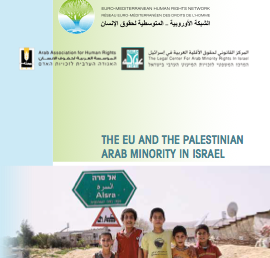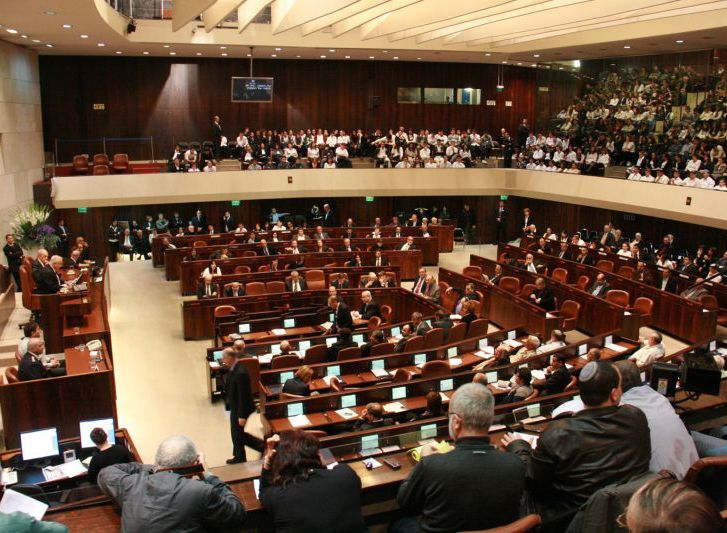For first time since it was upheld by Supreme Court, Israeli government relies on Jewish Nation-State Law to justify new policy
In an unprecedented move, the Israeli Ministry of Education (MoE) justified a policy aimed against Palestinian citizens of Israel, citing the 2018 Jewish Nation-State Basic Law. As part of its NIS 2.4 billion (US $691 million) “Administrative Pedagogical Flexibility” program, in which schools will be permitted to autonomously select educational programs, the MoE banned the participation of external providers who refuse to sign a statement adhering to Zionist values.
The ministry’s position was sent to Adalah – The Legal for Arab Minority Rights in Israel, following a Jerusalem District Court order on a petition filed by Adalah on behalf of the National Committee of Arab Mayors, the Follow-up Committee on Arab Education, and the Al-Tufula Center.
Adalah Attorney Salam Irsheid submitted the petition on 13 April 2022 after the MoE published a tender requiring that providers were required to sign a statement declaring that their proposed plans "shall not include an external party whose goals or actions, or statements include “the denial of the existence of Israel as a Jewish and democratic state” or “marking Israel’s official Independence Day as a day of mourning”. These terms are taken verbatim from Israel’s “Nakba Law” (Amendment No. 40 to the Budgets Foundations Law), which Adalah petitioned against to the Israeli Supreme Court in 2011.
In its response, the ministry acknowledged that the conditions for participating in the bidding process indeed “limit freedom of expression and criticism”, but added that such limitation is made by virtue of the powers conferred on it by law, relying on the Jewish Nation-State Law. The ministry noted that refusing to abide by the requirements “frontally and clearly negate the spirit of Israel’s basic laws, including provisions of the Basic Law: Israel as the Nation-State of the Jewish People which determines that Israel is the nation-state of the Jewish people and that Independence Day is Israel’s official national holiday”. Following this response, the court rejected the MoE request to dismiss the petition and ordered Adalah to amend it by 30 June 2022, so it would include a response to the legal position expressed by the MoE.
Administrative Petition 26699-04-22, Al-Tufula Center, et. al. v. The Ministry of Education (Jerusalem District Court)
- CLICK HERE to read about Adalah’s petition [Hebrew]
- CLICK HERE to read Adalah’s initial letter [Hebrew]
- CLICK HERE to read the Education ministry’s response [Hebrew]
Adalah Attorney Salam Irsheid commented:
Background on the Nakba Law case and the Jewish Nation-State Law
The petition against the "Nakba Law", filed by Adalah and other organizations in May 2011, was rejected on the basis of the ripeness doctrine in Israeli constitutional law, with the Israeli Supreme Court finding in 2012 that the case was premature for decision, without addressing the merits of the law or the arguments against it. The “Nakba Law” therefore is still subject to constitutional review. In their 2012 decision however, the justices noted that the “Nakba Law” raises complex issues of public importance.
- CLICK HERE for more information on the Nakba Law
In 2018, the Israeli Knesset passed the Jewish Nation-State Basic Law that constitutionally enshrines Jewish supremacy and the identity of the State of Israel as the nation-state of the Jewish people. This law – which has distinct apartheid characteristics – guarantees the ethnic-religious character of Israel as exclusively Jewish and entrenches the privileges enjoyed by Jewish citizens, while simultaneously anchoring discrimination against Palestinian citizens and legitimizing exclusion, racism, and systemic inequality. In 2021, the Israeli Supreme Court upheld the Law in a 10 to 1 decision. In the state’s response to the 15 petitions filed against the law, the Attorney General claimed that the law is largely symbolic and declarative in its nature, and future implications of it on constitutional rights are merely speculative. In the ruling, Chief Justice Esther Hayut, stated that The Basic Law is “but one chapter in our constitution taking shape and it does not negate Israel's character as a democratic state", and that it does not detract from the individual rights of non-Jewish citizens, especially in light of other laws that ensure equal rights to all. A similar claim was expressed by Israel to the UN Committee on Economic, Social and Cultural Rights in 2019, and various other international bodies. Numerous human rights treaty bodies – including the CESCR, CERD and the HRC – and UN human rights experts - have all found that the Jewish Nation-State Law violates Israel’s human rights commitments and it must be amended or cancelled.
- CLICK HERE for more information on the Jewish Nation-State Law
Related Press Releases:
Adalah petitions against the Education Ministry: Implementing the “Nakba Law” in state tenders is illegal 13 April 2022
Israeli Supreme Court upholds the racist and discriminatory Jewish Nation-State Law 08 July 2021

















